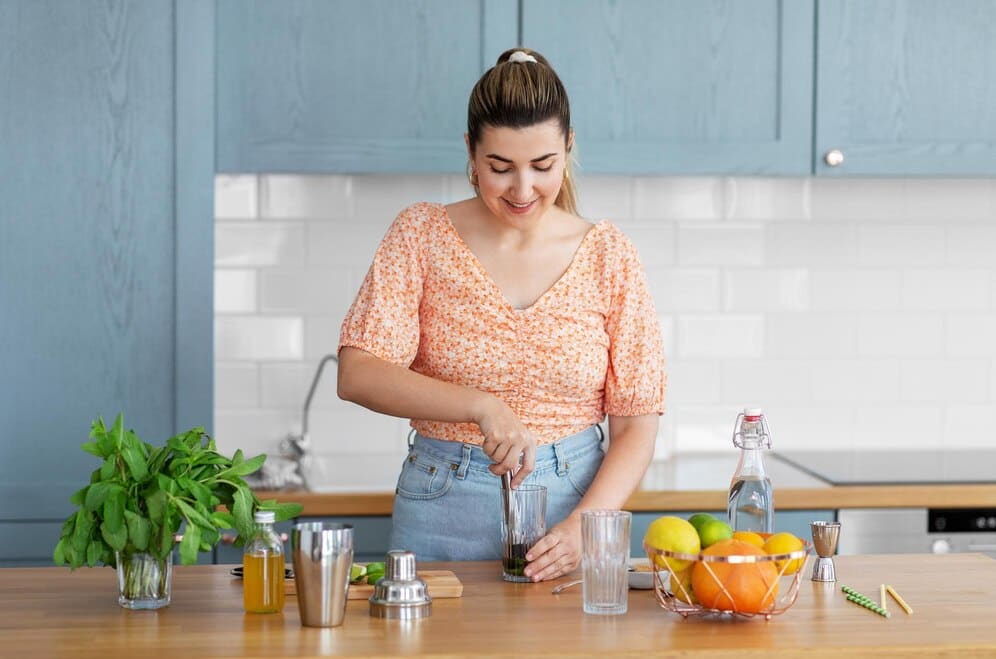Last updated on May 8th, 2025 at 03:59 pm

Chronic pancreatitis can make daily living very difficult. Life might be challenging because to the continual pain and food restrictions. Home remedies and Ayurvedic medicine provide a comprehensive strategy to treating this illness for anyone looking for alternatives to mainstream therapy. We will explore the top Ayurvedic and Homemade treatments for chronic pancreatitis in this extensive article, giving you helpful advice and insightful knowledge.
What Is Chronic Pancreatitis?
Long-term pancreatic inflammation that results in permanent damage is known as chronic pancreatitis. Chronic pancreatitis slowly reduces the pancreas’ capacity to function, in contrast to acute pancreatitis, which is a quick inflammation that is treatable. Diabetes and serious digestive problems can result from this illness. Recognizing the symptoms of chronic pancreatitis is vital for efficient handling and treatment.
Reasons for Pancreatitis
Effective treatment for chronic pancreatitis requires an understanding of its root cause. Consuming too much in drinking is one of the main causes. Long-term drinking can cause pancreatic tissue to become inflamed and scarred. Genetic predisposition is a crucial contributing factor. People may be more prone to pancreatitis if they have unique genetic variations. Moreover, autoimmune illnesses may also play a role, in which the pancreas is attacked by the body’s immune system. Patients can take preventative action to stop more problems by recognizing these reasons.
Pancreatitis signs and symptoms
For an early diagnosis and course of treatment, it is essential to identify the signs and symptoms of chronic pancreatitis. Persistent stomach pain that frequently radiates to the back is one of the common symptoms. This pain may be extreme and paralyzing. Additional signs and symptoms include nutritional malabsorption, which results in.
Exploring Pancreatitis Treatments
1. Conventional Medical Interventions
Traditional treatment options for chronic pancreatitis concentrate on symptom management and damage control. Analgesics and nerve blocks are frequently used in pain management, which is an important component. Another popular treatment is pancreatic enzyme supplements, which patients take as part of enzyme replacement therapy to help with digestion. Surgical treatments may be required in extreme situations to empty tumors or remove damaged tissue. Even while these therapies have a high rate of success, they frequently have negative side effects and might not treat the root of the issue.
2. Avoiding Pancreatitis Recurrence
Changes in lifestyle and continued medical care are necessary to stop returning of chronic pancreatitis. Alcohol and smoking are discouraged for patients since they can make the illness worse. To ease the stress on the pancreas, a low-fat diet is advised. Blood sugar levels should be regularly monitored, especially for people who are at risk of developing diabetes. Patients can improve their quality of life and lessen the frequency of flare-ups by implementing these preventive actions.
3. Pancreatitis Treatments with Ayurveda
The traditional Indian medical system known as Ayurveda provides comprehensive care for chronic pancreatitis. The main goals of Ayurvedic medicine are to promote general health and balance the body’s energy. Ayurveda places a lot of value on herbal medicines. Herbal with anti-inflammatory qualities, such as Indian gooseberry, ginger, and turmeric, can help lessen pancreatic inflammation. Ayurvedic doctors also suggest making dietary adjustments, such as cutting back on spicy and fatty meals and increasing your intake of easily digested foods. In addition, Ayurvedic treatments frequently incorporate stress-reduction techniques like yoga and meditation because they might have harmful impacts on the pancreas.
Integrating Home Remedies for Pancreatitis
1. Home Remedies That Work
For chronic pancreatitis, home remedies can be used in addition to traditional and Ayurvedic therapy. A useful treatment is to consume foods high in antioxidants. Nuts, spinach, and blueberries are a few foods that can lessen the pancreas’ oxidative stress. Ginger tea, which has anti-inflammatory and digestive benefits, is another natural treatment. By easing the strain on the pancreas, eating small, frequent meals rather than large ones additionally helps in the management of symptoms.
2. The Value of Hydration
For those who have chronic pancreatitis, keeping proper water intake is essential. Staying hydrated and keeping up healthy digestion are two benefits of drinking lots of water. Herbal teas with anti-inflammatory and digestive properties include peppermint and chamomile. It’s critical to stay away from sugary and caffeinated drinks as these can make symptoms better.
3. Stress-Reduction Methods
Stress may make chronic pancreatitis better. Your condition might be considerably improved by implementing stress management practices into your everyday routine. Stress reduction techniques like yoga, mindfulness meditation, and deep breathing exercises can be helpful. Frequent exercise, such as swimming or walking, can also improve general wellbeing and lessen the negative effects of stress on the body.

The Role of Diet in Managing Pancreatitis
1. Anti-Inflammatory Food Plan
When it comes to controlling chronic pancreatitis, an anti-inflammatory diet might be very important. Foods that support general health and minimize inflammation are part of this diet. Omega-3 fatty acid-rich foods like salmon and flaxseeds can aid in the decrease of inflammation. Berries, almonds, and leafy greens are other fantastic options. Because they may increase inflammation, processed foods, refined carbohydrates, and trans fats must be avoided.
2. Reduced-Fat Diet
A low-fat diet is suggested for those who struggle with chronic pancreatitis. Limiting back on fat consumption eases the pancreas’s strain. Choose lean proteins like fish and poultry, and make sure your diet includes healthy grains, fruits, and vegetables. Frying is not the best way to cook; baking, steaming, and grilling all better.
3. Extra nutrients
Supplements containing digestive enzymes can help with the breakdown of proteins, lipids, and carbs. These supplements can enhance nutrition digestion and help with symptoms such as the condition. To get the right protein supplement and dose for your condition, speak with a medical expert.
Difference Between Generic and Non-Generic Medicine
1. Understanding Generic Medicine
Regarding dosage, safety, strength, quality, and intended usage, generic medications are similarly to name-brand medications. Compared to their name-brand alternatives, they are frequently more economical. Generic medications may be a more affordable option for treating the symptoms of chronic pancreatitis. It is crucial to speak with a medical expert to be sure generic medications are suitable for your condition.
2. Advantages of Non-Generic Medicine
Pharmaceutical companies are the ones who produce and market non-generic medications, usually referred to as brand-name drugs. To guarantee their safety and effectiveness, these medications are put through a comprehensive testing and research process. Because they are familiar with to or believe they work better than generic medications, some patients might prefer them. It is important to weigh the benefits and drawbacks of both generic and non-generic choices and select the one that best suits your needs.
3. Choosing Professionally
Think about things like price, connectivity, and personal choice when choosing between generic and non-generic medications. You can make an informed decision based on your unique condition and treatment objectives by speaking with a healthcare expert. Though individual requirements and situations may differ, both methods can be useful in managing chronic pancreatitis.
Conclusion
Because chronic pancreatitis is a challenging illnesses, treatment must take a multimodal strategy. People can control their illness improve their quality of life by learning the causes and symptoms, looking into traditional and Ayurvedic treatments, and utilizing successful home remedies. An anti-inflammatory, low-fat diet can greatly lessen symptoms of chronic pancreatitis. Diet is a key factor in managing the condition. It essential to make well-informed selections based on your requirements and situation while selecting medications, whether generic or non-generic.
Consulting with medical professionals and experts in Ayurveda can offer informative advice and support to anyone looking for personalized guidance. People with chronic pancreatitis can improve their health and well-being by being proactive and investigating natural treatment options.
Make an appointment for a consultation with a licensed Ayurvedic specialist if you’d like additional information about Ayurvedic therapies for chronic pancreatitis. Their knowledge can assist you in creating a personalized therapy that takes into account your particular requirements and enhances general health. Explore the advantages of holistic treatment for chronic pancreatitis and take control of your health right now.
FAQs on Pancreatitis Treatment
1. Which diet is ideal for people with chronic pancreatitis?
It is important to follow a diet that promotes pancreatic health. Pay attention to foods that are low in fat and easily digested. Make sure to include lots of nutritious grains, fruits, veggies, and lean proteins. Steer clear of deep fried greasy, and industrially produced foods. Having more frequent, smaller meals can also aid with symptom management.
2. Can traditional medical care be replaced by Ayurvedic medicine?
While they can supplement traditional care, ayurvedic treatments shouldn’t take its place. Before beginning any new treatment, always get advice from your healthcare professional. Chronic pancreatitis can be managed holistically by combining medical treatments with Ayurvedic concepts.
3. Are Ayurvedic treatments related to any side effects?
When provided under the guidance of a licensed professional, ayurvedic treatments are usually safe. That being said, certain treatments and herbal extracts might have negative effects or interfere with medication. Before beginning any new treatment plan, always consult a healthcare provider.